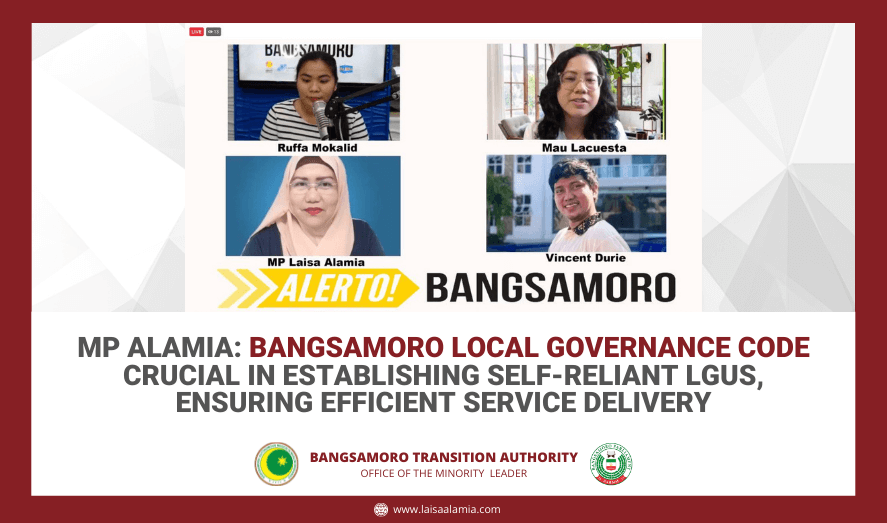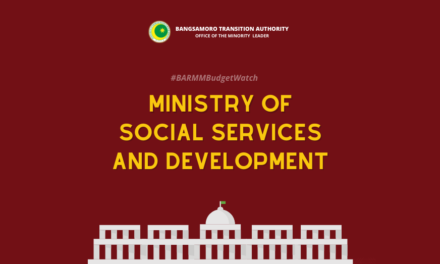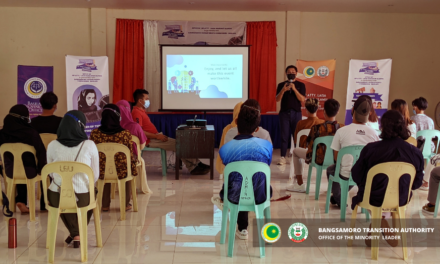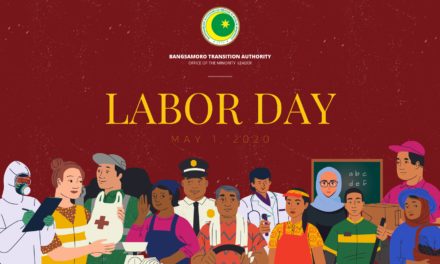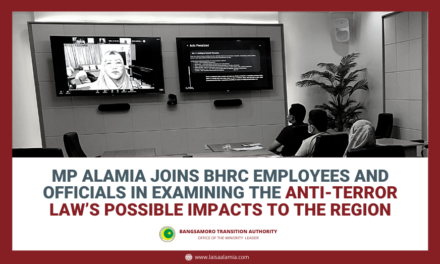As part of efforts to mainstream the discussions on regional policy making in the Bangsamoro region, Minority Floor Leader MP Atty. Laisa Masuhud Alamia served as a resource person regarding the process behind the drafting of the Bangsamoro Local Government Code (BLGC) in the Feb. 15 episode of Alerto! Bangsamoro, a radio program on DXMS Radyo Bida Cotabato City, hosted by Maureen Lacuesta and Ruffa Mokalid.
“The BLGC is a response to the requirement of the Bangsamoro Organic Law (BOL),” she said, “which is to enact legislation that will prescribe the policies of the Bangsamoro government regarding constituent local government units in the BARMM.”
The BLGC is a priority legislation identified in the BOL, as indicated in Article VI, Section 10. The said provision states that “the authority of the Bansamoro Government to regulate the affairs of its constituent local government units shall be guaranteed in accordance with this Organic Law and a Bangsamoro Local Government Code to be enacted by the Parliament,” while also taking note that “the privileges already enjoyed by local government units under Republic Act No. 7160 (RA 7160), otherwise known as the Local Government Code of 1991, as amended, and other existing laws shall not be diminished.”
Defining, delineating, devolving service delivery
MP Alamia said that the BLGC is important in addressing ambiguities within the BOL, especially in defining the relations, delineated roles, and other matters related to the governance system of the Bangsamoro. “In simpler terms,” she said, “this piece of legislation is very crucial because, without it, we’ll miss out on the opportunity to set up a local governance system that is in line with the asymmetric authority delegated to us by the Constitution and the BOL.”
The BLGC is also “important not only to the Bangsamoro government, but more importantly to the Bangsamoro people, because they are entitled to a broad range of services,” she noted.
MP Alamia, who also served in the now defunct ARMM regional government, said that “based on our experience, even before we transitioned into the BARMM and before the ARMM was established, we really have issues in the delivery of basic social services.”
To address this, she said that “the BLGC needs to include rules and provisions on how to deliver services more efficiently while making our LGUs more self-reliant,” especially since most of the LGUs in the region are are 90% to 100% dependent on funds derived from internal revenue allotment (IRA). “This means that without the IRA, our LGUs cannot survive,” MP Alamia noted, therefore “the goal of our BLGC is to also ensure that self-reliant LGUs in the BARMM.”
When asked about the similarities between the RA 7160 and the draft BLGC, MP Alamia said that if the BLGC is too close to the Muslim Mindanao Autonomy Act No. 25 or An Act Providing for a Local Government Code of ARMM, which is simply a reiteration of RA 7160. “What then is the added value of drafting the BLGC if it is just going to be a cut-and-paste of the national local government code? It may end up being a wasted opportunity to draft a local government code that is anchored on the BARMM context.”
“It must be clear (in the BLGC) that we are a parliamentary form of government, and this is what local governance looks like in a parliamentary form of government,” MP Alamia emphasized, “while also taking note of the powers of LGUs that must not be diminished, as provided for in the BOL.”
BLGC not the only legislation that will shape local governance in BARMM
When asked about the provisions referring to political dynasties in the BARMM, MP Alamia is quick to admit that it is “a very controversial issue” given the context and history of the Bangsamoro, but it is also “not new.”
Legislation concerning political dynasties has long been a topic of ongoing discussions at the national level – in the national local government code, the electoral code, and other laws that must be passed in order to address the issue. This means that it goes beyond the BLGC, and any approach to political dynasties must be supported by other policies and programs at all levels of government.
“There is said to be a draft electoral code by the government of the day, however it is not yet filed in the parliament,” MP Alamia said, “while the minority bloc of the Bangsamoro Parliament has already filed its own version and we are waiting for it to be discussed.”
“It’s going to be very difficult,” she noted, “but if we need to start the discussion. It is not only in the hands of the parliament or those who drafted the BLGC or electoral code, because the voice of every constituent and sector must be heard.”
When asked about the election prospects for the 63 barangays in North Cotabato that are now part of the special geographic area (SGA) of the Bangsamoro, MP Alamia said that it is yet another issue they have already anticipated, and one that can be better addressed by the Bangsamoro Electoral Code.
“That said, the BLGC is an essential legislation that can help resolve the issue of the 63 barangays in the SGA,” she noted, “because it will set the policies that will govern these areas as constituent units of the BARMM, and it will prescribe the requisites and rules in relation to the Bangsamoro government’s power to create, divide, merge, abolish, or alter the boundaries of municipalities.”
“It’s important that we take time to conduct the consultations on LGC and EC and to consider implementation,” MP Alamia stressed, “because we do not want to set ourselves up to fail.”

